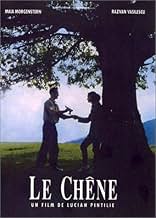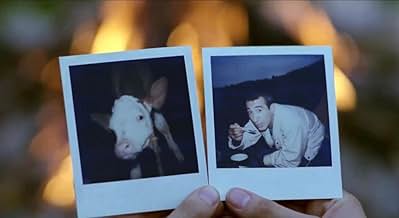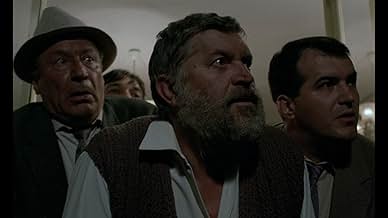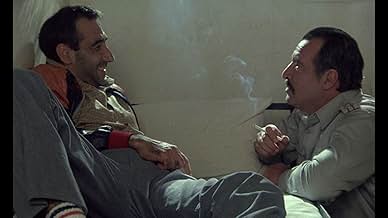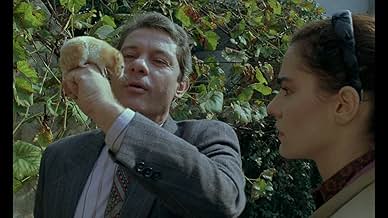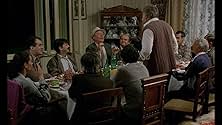NOTE IMDb
7,8/10
4,1 k
MA NOTE
Une description de la Roumanie avant la chute de Ceausescu, à travers l'histoire de Nela, qui alors qu'elle vient de perdre son père, décide de quitter Bucarest, préférant enseigner dans une... Tout lireUne description de la Roumanie avant la chute de Ceausescu, à travers l'histoire de Nela, qui alors qu'elle vient de perdre son père, décide de quitter Bucarest, préférant enseigner dans une petite ville de province.Une description de la Roumanie avant la chute de Ceausescu, à travers l'histoire de Nela, qui alors qu'elle vient de perdre son père, décide de quitter Bucarest, préférant enseigner dans une petite ville de province.
- Réalisation
- Scénario
- Casting principal
- Récompenses
- 3 victoires et 1 nomination au total
Avis à la une
Actually the Romanian title of the movie would be "Balance" or "Scales" or "Steel Yard", pick the word most appropriate to your liking for the weight measuring gadget. The international titles (The Oak, la Chene) are linked to the last scene of the movie that metaphorically wraps up significations. The main characters have found the long sought, yet not traceable balance, equilibrium.
Why did I say that it depicts humiliation of intelligence and culture? In communist Romania people that graduated university or college were repartitioned to a job matching their studies. Only the luckiest got a repartition in a large city. Others were summoned for life in hamlets, as you could not promote or change your repartition unless joining the Party. That's the case with the leading character (Maia Morgenstern) that graduated Psichology in Paris, and was repartitioned in Copsa Mica, the most polluted city in Romania.
The caravan of insults starts with the train journey to her new work place. She is forced to switch trains in the night, take her clothes off in the presence of strangers, and ride 400 km standing in an overcrowded train. As she reaches Copsa Mica some people try to rape her, police torture and threaten her, and so on.
To certify the adage that special people congregate the Psichology graduate meets a funky doctor, that manages to elude the system by being some kind of a joker. Then the rejoicing begins as these 2 people get to know each other.
When they decide under the oak tree to give birth to a child she says: "I pray he won't be normal" and he responds "If he'll be normal I'll kill him with my own hands." For these two people being "normal" meant the supreme course. Everybody around was dull, normal and communist. Enjoy!
Why did I say that it depicts humiliation of intelligence and culture? In communist Romania people that graduated university or college were repartitioned to a job matching their studies. Only the luckiest got a repartition in a large city. Others were summoned for life in hamlets, as you could not promote or change your repartition unless joining the Party. That's the case with the leading character (Maia Morgenstern) that graduated Psichology in Paris, and was repartitioned in Copsa Mica, the most polluted city in Romania.
The caravan of insults starts with the train journey to her new work place. She is forced to switch trains in the night, take her clothes off in the presence of strangers, and ride 400 km standing in an overcrowded train. As she reaches Copsa Mica some people try to rape her, police torture and threaten her, and so on.
To certify the adage that special people congregate the Psichology graduate meets a funky doctor, that manages to elude the system by being some kind of a joker. Then the rejoicing begins as these 2 people get to know each other.
When they decide under the oak tree to give birth to a child she says: "I pray he won't be normal" and he responds "If he'll be normal I'll kill him with my own hands." For these two people being "normal" meant the supreme course. Everybody around was dull, normal and communist. Enjoy!
The second Pintilie movie I have seen recently (thanks to Duna TV) and even better than the previous one (O Vara de neuitat): a great movie indeed! This is the Romanian version of Kusturica's Underground, or perhaps I should I say the opposite, since Balanta is actually an earlier piece. The fast-paced, furious story packed with bitter irony and surrealistic moments (well, the closer you live to the country, the less surrealistic they are: comments from people living in Ceausescu's Romania state that the film has nothing "unreal" in it) captures the essence of one of the darker dictatorships of the former Communist Bloc, where the harshness of oppression is softened only by the corruption of the society. Just like Kusturica in Underground, Pintilie presents a very critical picture of the society but at the same time he clearly shows his sympathy towards his suffering but talented and charming nation. All in all: stunning pictures, perfect acting and shocking scenes combine in Balanta for a perfect piece of cinema.
I' give'it a ten because character Mitica is based on a real life person that happens to be my father(not biological but the person who raised me). My father is a urological surgeon that never took money from his patients (I know sounds unrealistic especially for Romania, but is true). One of his patients was Ion Baiesu, who was really impressed by him so he wrote the short novel "thirty-eight point two" and dedicated him. Also the movie "Mere Rosii" (red apples) is about my father.
If you want to know more just e-mail me at Whitenight2mw on yahoo.
Soryy if my grammar isn't so good.
If you want to know more just e-mail me at Whitenight2mw on yahoo.
Soryy if my grammar isn't so good.
Society has always been depraved and almost worthless in its general aspects. Now, to look at how people behave during a detention-like state is even more interesting, which swiftly brings me to the following affirmation: living under a dictatorship draws a clear distinction between the elite and the rest. It elevates true values, which unfortunately have to be kept under secrecy due to the paranoid mentality of the government. But the beauty of it, the absolute splendor is to see how these courageous people come together, despite having to sacrifice and risk a lot. I suppose people with similar traits are drawn to one another out of pure instinct.
"Balanta" portrays the destiny of two people who daringly oppose the regime, not for their own fate, but for the fate of those around them who deserve it. Their brave madness is shockingly amusing and thrives within the viewer. Even though playing against the rules can be very tricky, if done according to the (unwritten) book, it can prove extremely rewarding, especially for the spirit. Despite its sometimes eye-brow raising dialogue, Maia Morgenstern and Razvan Vasilescu scratch up reasonably good and humorous performances, pumping adrenaline into the film itself.
The movie is an awe-inspiring tribute to those who could(can) simply not adapt to the nearly psychotic way of life lead by many under totalitarian regimes. Pintile cleverly points out the discrepancies between "actual" normality and the state of things during times when normal becomes strangely unfamiliar. "Balanta" is a worthy picture, especially given its controversial nature.
"Balanta" portrays the destiny of two people who daringly oppose the regime, not for their own fate, but for the fate of those around them who deserve it. Their brave madness is shockingly amusing and thrives within the viewer. Even though playing against the rules can be very tricky, if done according to the (unwritten) book, it can prove extremely rewarding, especially for the spirit. Despite its sometimes eye-brow raising dialogue, Maia Morgenstern and Razvan Vasilescu scratch up reasonably good and humorous performances, pumping adrenaline into the film itself.
The movie is an awe-inspiring tribute to those who could(can) simply not adapt to the nearly psychotic way of life lead by many under totalitarian regimes. Pintile cleverly points out the discrepancies between "actual" normality and the state of things during times when normal becomes strangely unfamiliar. "Balanta" is a worthy picture, especially given its controversial nature.
For a Romanian who has fled Ceausescu's brutality in 1985,this film is not only a revenge but also a proof that even in the darkest political system talent can survive because everyone who is implicated in the creation of this masterpiece(director,screenwriters,actors,crew grew,studied and worked in the "socialist paradise". I have seen the film twice; at first I was a little shocked by its "naturalism" and only later I realized that this was the life for at least 90% of the Romanians. Of course only somebody who grew in a communist country can fully appreciate the film's realism,its brutal black humor but I think the real message transcends this : one must fight for his ideals,there is always hope!
Le saviez-vous
- ConnexionsFeatured in Filmare/Filmage (1992)
Meilleurs choix
Connectez-vous pour évaluer et suivre la liste de favoris afin de recevoir des recommandations personnalisées
Détails
Box-office
- Budget
- 3 700 000 $US (estimé)
Contribuer à cette page
Suggérer une modification ou ajouter du contenu manquant

